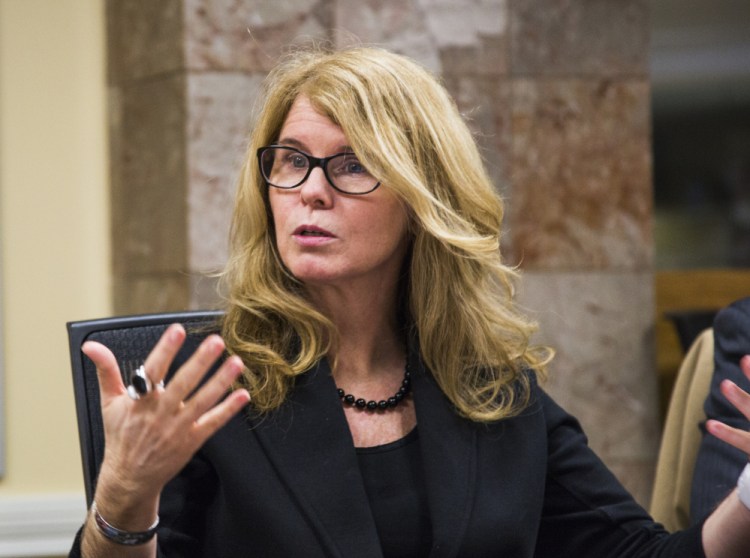Maine’s top health official said Tuesday that the state is working on solutions to the heroin epidemic and needs better data from substance abuse providers to help guide its effort to connect patients with effective, quality treatment.
Mary Mayhew, the state’s health and human services commissioner, visited the Press Herald’s editorial board Tuesday for a wide-ranging conversation during which she gave detailed answers on a number of topics, including the state’s strategy to alleviate the heroin crisis.
She said substance abuse providers that contract with the state have left some money unspent – about $500,000 – which is one indication that the availability of treatment is meeting demand.
But those running substance abuse treatment programs have frequently complained there’s not nearly enough treatment capacity in Maine to tackle the heroin crisis. For instance, at Operation HOPE, a program created last year by the Scarborough Police Department that refers addicts to treatment programs, most of the placements have been out-of-state, officials have said. The uninsured have an especially difficult time obtaining treatment, according to numerous interviews with those who run treatment programs.
“We have seen a disconnect on this,” Mayhew said.
ENSURING EFFECTIVE TREATMENT
She said there are large gaps in data that would help inform decisions on state strategy.
“The providers are not submitting comprehensive data to us. We’re not getting the kind of detail we need,” Mayhew said. She said the state also is revamping its “antiquated” computer systems so that data can be more easily retrieved and analyzed.
Mayhew said the state needs to learn more details about the problem before determining the best path forward. It’s not only identifying the scope, but also how to best spend the available money for treatment, about $76 million annually, she said.
Heroin deaths have soared in recent years, reaching 57 in 2014 and 71 through the first nine months of 2015, the latest statistics available. The number of people seeking treatment for opiate addiction increased from 1,115 in 2010 to 3,463 in 2014.
Meanwhile, Gov. Paul LePage on Tuesday signed a compromise bill that sets aside $3.7 million to address the heroin epidemic, including $2.5 million for more treatment options and 10 additional drug agents. But the bill’s proponents agree that the additional money is a first step and not a solution to the crisis.
Mayhew said that unlike other aspects of health care, determining the most effective standards of care for addiction services is complicated and a matter of debate among treatment experts.
Nevertheless, Mayhew said the state needs to set evidence-based performance expectations for substance abuse providers, to make sure that people are getting effective treatment and that the state isn’t spending money on programs that don’t get results.
“What is challenging for all of us is not only providing access to treatment, but the quality of the treatment,” Mayhew said.
She pointed to Vermont and Michigan as possible models that Maine could draw from, saying those states seem to do a good job of connecting effective treatment to patients.
She said methadone clinics, for instance, should be held to higher standards than currently exist – for example, by making sure patients are receiving behavioral therapy in addition to the methadone doses. Mayhew said the methadone clinics also need to be integrated into Maine’s overall health care system.
“Methadone clinics are islands,” she said. “They are not part of a coordinated system of care.”
REDUCING OPIOID PRESCRIPTIONS
Mayhew said the state should ensure that patients entering methadone clinics are evaluated upon entering, to see if they’re good candidates for other forms of treatment, such as Suboxone. And the state also should make sure clinics are tapering patients off methadone if they can be weaned off the drug.
“We need to create expectations within the clinics,” Mayhew said.
She said she also hopes to expand the success of the state’s prescription drug rules for Medicaid, which resulted in a 45 percent reduction in the number of opiate prescriptions written from 2012 to 2014, according to DHHS. Prescription opiates often are a gateway to heroin use, numerous studies have shown.
The state now requires doctors who treat Medicaid patients to take extra steps to justify opioid prescriptions. This has led to a sharp decline in opioid prescriptions among Medicaid patients that has not been replicated among patients with commercial insurance in Maine.
Gordon Smith, president of the Maine Medical Association, a trade group that represents physicians before the Legislature, told the Press Herald in November that the association would support the Medicaid rules being applied to all opioid prescriptions.
Mayhew said she’s happy to hear the MMA is in favor of more restrictions on opioid prescribing, and she believes the state will start taking those steps soon.
Send questions/comments to the editors.




Success. Please wait for the page to reload. If the page does not reload within 5 seconds, please refresh the page.
Enter your email and password to access comments.
Hi, to comment on stories you must . This profile is in addition to your subscription and website login.
Already have a commenting profile? .
Invalid username/password.
Please check your email to confirm and complete your registration.
Only subscribers are eligible to post comments. Please subscribe or login first for digital access. Here’s why.
Use the form below to reset your password. When you've submitted your account email, we will send an email with a reset code.